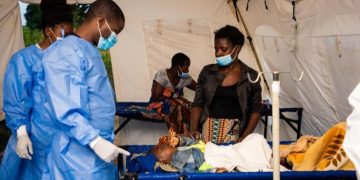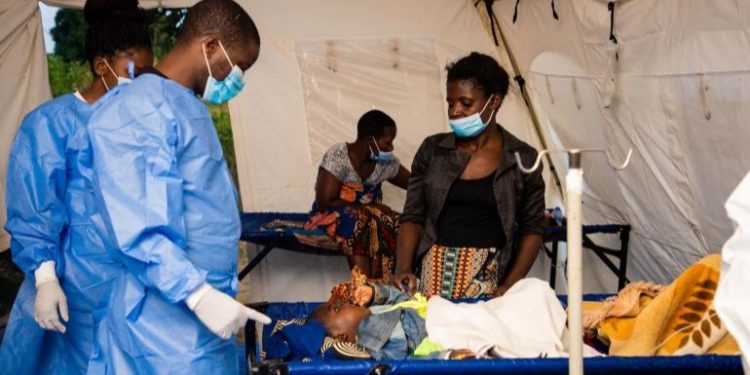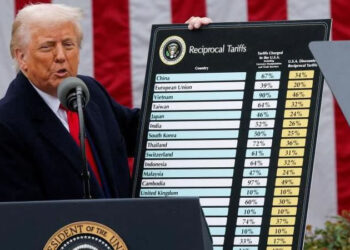The European Union has made it clear that it cannot make up for the funding shortfall left by the United States’ decision to suspend key aid programs, a move that has left African governments struggling to keep vital health services operational.
The United States has historically been the largest single provider of foreign aid, distributing $72 billion in 2023 alone, with a significant portion handled by the United States Agency for International Development (USAID).
By comparison, the European Union, as the largest collective donor, provided nearly $100 billion in aid that same year.
“We will not step back from our humanitarian commitments,” a European Commission spokesperson told Semafor, saying the bloc’s 2025 humanitarian budget alone stands at $1.9 billion — with $510 million earmarked for Africa.
But the spokesperson added: “The funding gap is getting bigger, leaving millions in need. The EU cannot fill this gap left by others.”
The situation in sub-Saharan Africa is already worsening, as the Trump administration’s 90-day freeze on USAID funding takes effect.
Most of USAID’s budget in the region is dedicated to humanitarian aid and public health initiatives, with over $11 billion allocated to Africa in 2024, according to official data.
The funding halt has already led to the closure of HIV treatment centres in Uganda and disrupted vaccination campaigns in Nigeria.
Dr. Catherine Kyobutungi, director of the African Population and Health Research Center, warned that unless replacement funds are secured quickly, millions of people across Africa could face serious health risks. The scope of USAID’s involvement in Africa is vast.
In Uganda, PEPFAR, the US President’s Emergency Plan for AIDS Relief, has been the primary funding source for nearly two-thirds of HIV-related programs. Meanwhile, Nigeria received $600 million in US health assistance in 2023, an amount equal to 20% of the country’s health budget at the time.
Although some essential programs have been granted waivers, the aid suspension has left many health services in limbo. In Kenya alone, approximately 54,000 health workers could lose their jobs if USAID-backed projects remain unfunded.
Reproductive health programs are among those taking the hardest hit. “A lot of people working in this space have lost funding,” Kehinde Ajayi, director of the Gender Equality and Inclusion Program at the Center for Global Development, told Semafor.
Governments across the continent are rushing to contain the fallout. Nigeria recently approved $200 million in its 2025 budget to offset the loss of US health funding, while Ghana’s President, John Dramani Mahama, instructed his finance minister “to take urgent steps” to address a $156 million funding shortfall, emphasizing the need to sustain malaria control efforts and maternal health programs.
The situation has prompted urgent appeals for other nations to step in. Romilly Greenhill, CEO of Bond, a UK-based coalition of development organizations, urged Britain and the EU “to help mitigate the impact of the USAID freeze.”
In a separate analysis, two researchers from the Center for Global Development wrote that “the US’s absence should encourage other provider countries to step up,” highlighting Germany, Sweden, and Japan as potential alternative donors. They also suggested China could consider restructuring some of its African loans into grants to assist with the crisis.
But will international donors step forward? Zainab Usman, director of the Africa Program at the Carnegie Endowment for International Peace, believes the US aid freeze is part of a wider shift among wealthy nations toward reducing foreign assistance. She noted that Canada and the UK have already scaled back development funding, signalling a broader retreat from traditional donor commitments.
For middle-income countries like Kenya, Nigeria, and South Africa, Usman suggests the crisis could be a turning point, forcing governments to reconsider their financial policies.
She described the funding cut as a “wake-up call”, arguing that African nations should work toward better revenue management, tackling corruption, and closing financial loopholes to sustain key services without relying on external donors.
However, she acknowledged that poorer nations will face much greater difficulties, as in several African countries, US aid represents an average of 11% of gross national income.
Given the sheer scale of USAID-funded programs in Africa, no single country is in a position to fully cover the gap. Ajayi stressed that the solution must involve multiple players, including governments, development banks, nonprofit organizations, and wealthier African nations working together to support the region.
Some argue that the crisis could spur long-term reforms, pushing African nations to reduce their reliance on foreign donors for essential services.
While discussions about alternative funding models are gaining momentum, the sudden nature of the USAID freeze leaves little time for a smooth transition, meaning the immediate consequences will be severe. With the US government reshaping its approach to foreign aid, the effects will likely be felt across Africa for years to come.
In a memo last month, US Secretary of State Marco Rubio sent a clear message on services the new administration is no longer prioritizing.
The freeze waiver “does not apply to activities that involve abortions, family planning conferences, administrative costs… gender or DEI (diversity, equity, and inclusion) ideology programs, transgender surgeries, or other non-life saving assistance,” he wrote.
Tech billionaire Elon Musk, head of Trump’s Department of Government Efficiency, put it this way on X: “USAID is a criminal organization. Time for it to die.”




































